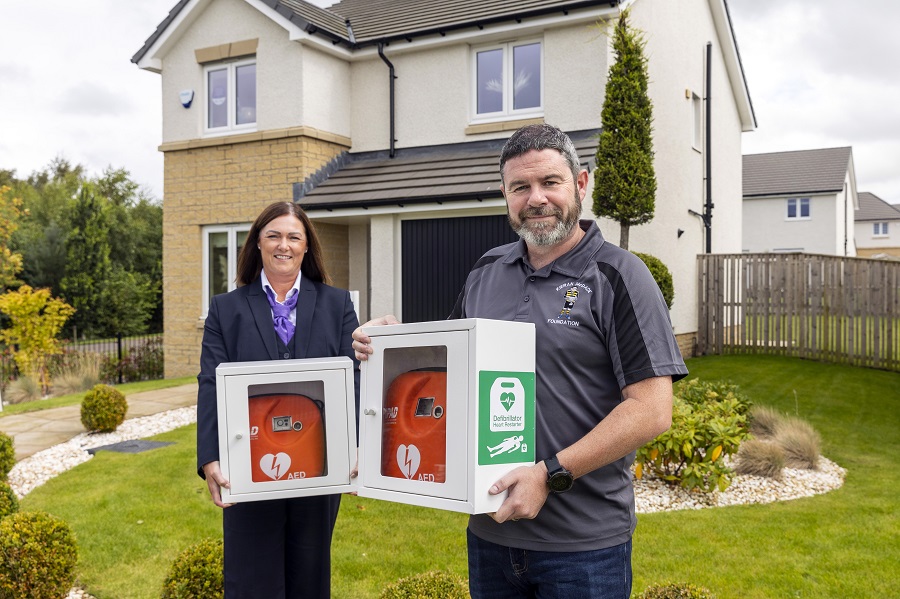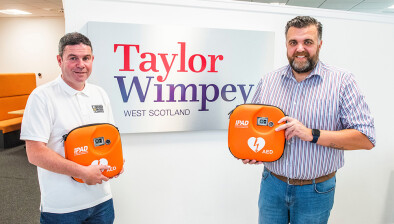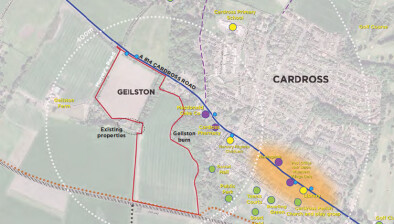Taylor Wimpey West Scotland donates lifesaving defibrillators to The Kieran McDade Foundation

Derek Murphy from the Kieran McDade Foundation receives two defibrillators from Taylor Wimpey West Scotland’s sales executive Gillian Byrne at Torrance Place in Holytown.
Taylor Wimpey West Scotland has donated two more public access defibrillators (PADs) to The Kieran McDade Foundation.
The PADs will benefit two local football or sports clubs in Scotland, bringing the housebuilder’s donation of lifesaving equipment to the Foundation to four.
As part of a joint initiative with the British Heart Foundation (BHF), the homebuilder is donating potentially life-saving PADs to communities around the UK to help people who suffer from an out-of-hospital cardiac arrest.
During 2019, the BHF worked with Taylor Wimpey to train its employees in CPR skills and to provide every one of their building sites in the UK with a defibrillator. As part of its commitment to leaving a lasting legacy in the areas in which it builds, Taylor Wimpey is donating the defibrillators to local communities when their developments are completed.
Taylor Wimpey has also committed to ensuring all of its defibrillators are registered on The Circuit, the national defibrillator network, which is a joint venture from the British Heart Foundation, the Association of Ambulance Chief Executives, the Resuscitation Council UK and St John Ambulance.
Data on defibrillators registered on The Circuit are visible on the despatch systems used by 999 call handlers. So, when a cardiac arrest occurs, the dispatcher can direct bystanders straight to the nearest defibrillator. This increases the chances of defibrillators being used quickly and significantly improves the chances of a successful resuscitation.
The Kieran McDade Foundation was set up in November 2016 by Dunbeth Football Club in memory of their bright footballing star, Kieran McDade, who tragically died after suffering a cardiac arrest during a training session with his teammates.
From then on, the club pledged to source as many defibrillators as possible and donate them to local football and sports clubs to make those places as safe as possible for all who use them. To date, the Foundation has placed 139 defibrillators across Scotland.
Deryck Schendel, regional health and safety advisor for Taylor Wimpey in Scotland, said: “It’s so important to us that we give something back to the communities where we’re building.
“Our partnership with the BHF is vitally important in helping to ensure that more defibrillators are available for people who might need them, and we are proud to continue our support of The Kieran McDade Foundation and the incredible work they do with football and sports clubs across Scotland be able to make this equipment readily accessible.”
Derek Murphy, from The Kieran McDade Foundation, added: “We can’t thank Taylor Wimpey enough for these defibrillators. They will be placed with two local football or sports clubs where we hope they never have to use them.
“It’s fantastic to know that through our work across Scotland, we’re increasing the number of sports clubs and football clubs with access to a defibrillator in an emergency and hopefully help save someone’s life.”
David McColgan, head of BHF Scotland, said: “Every second counts when someone has a cardiac arrest, and we know that prompt CPR and defibrillation can double the chances of survival in some cases. Increasing the number of publicly accessible defibrillators in our communities – alongside more of us learning CPR skills – can play a vital role in these critical moments.
“That is why we are delighted that Taylor Wimpey has contributed to the aims of the BHF by making public access defibrillators available to The Kieran McDade Foundation as part of their wider local campaign. It could help save a life.”
A defibrillator is a portable device that can be used by anyone to help restart the heart when someone suffers from a cardiac arrest and has stopped breathing. No specific training is needed, and the device will only deliver a shock to the heart if necessary. When someone has a cardiac arrest, every second counts. For every minute that passes without defibrillation and CPR the chances of survival decrease by around 10%.















